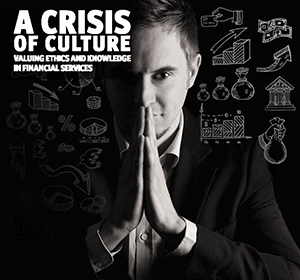Investor and Financial Industry Perceptions on Ethics: Is There a Disconnect?
CFA Institute sponsored two surveys in 2013 that gauge perceptions of ethical conduct within the investment industry. One survey sought the views of professionals across the financial services industry while the other focused on the perspectives of investors. The general consensus from both surveys: ethical conduct is critical to the success of the industry. However, financial services professionals are less likely to view their firms as a source of investor distrust.
Let’s start with the most recent study, A crisis of culture: valuing ethics and knowledge in financial services, produced by the Economist Intelligence Unit (EIU). This study gauged the perspectives of executives from asset management firms, commercial and investment banks, and firms of other sectors of the financial services industry.
It found that only slightly more than half (59%) of the financial services professional respondents believe the industry has a positive reputation. However, 71% of respondents say the ethical reputation of their firm is better than that of the industry overall. In fact, many respondents expressed the view that the actions of their investment industry peers were not as ethical as their own.
How does this compare to investors’ perceptions? The CFA Institute & Edelman Investor Trust Study, which surveyed more than 2,100 retail and institutional investors in Australia, Canada, Hong Kong, the United Kingdom, and the United States, revealed that only about half (52%) of survey respondents indicated that they trusted the financial services industry to do what is right.
In terms of what the industry can do to change investors’ perceptions, the EIU study demonstrates a desire among investment professionals surveyed to improve adherence to ethical standards by firm executives. From taking actions to raise the awareness of ethical conduct (67%) to strengthening an organization’s code of conduct (63%), executives understand that much is needed to change the global perception of the industry.
It’s worth noting that the low level of investor trust registered in the CFA Institute & Edelman Investor Trust Study did not translate directly into a perceived inability to benefit from investing. Indeed, nearly three in four respondents indicated they had a fair opportunity to profit from participating in the capital markets. However, when looking more closely at the strength of this vote of confidence, the financial services industry might have reason for concern: only 19% of respondents selected “strongly agree” — not a strong foundation for receiving second chances.
When the CFA Institute & Edelman Investor Trust Study delves into a subset of the broader financial services industry — investment managers specifically — investors placed a high level of importance on the principles of integrity when hiring an investment manager:
- Trusted to act in my best interest – 35%
- Ability to achieve high returns – 17%
- Commitment to ethical conduct – 17%
- Recommended by someone I trust – 15%
- Compliance with industry best practices – 8%
- Amount/structure of fees – 7%
How their manager was paid was of the lowest concern to investors surveyed. Investors want to trust that their investment manager is working for them and not for their own financial gain. At least for asset managers, if professionals continue to think of ethical conduct as an area where they can be “flexible,” they are likely missing out on clients who value trust over fees.
When it comes to career progression, 53% of financial services respondents to the EIU survey indicated that some level of flexibility on following ethical standards is necessary. What’s more, only 37% believe their firms would financially benefit if employees demonstrate improved adherence to ethical standards. Clearly, there is a disconnect.
CFA Institute has long supported high ethical standards within the investment industry. These research initiatives help us to draw attention to investor trust issues and work toward aligning the expectations of investors and the professionals they hire. The Code of Ethics and Standards of Professional Conduct that our members must follow are considered the gold standard that demonstrates a commitment to ethics.
But our members cannot improve investor trust alone. As an organization, we recognize that firms must play an active role in maintaining the ethical reputation of the industry. To this end, we have developed a number of voluntary codes and standards to guide the investment industry and to help ensure all investment professionals place client interests first. From the Global Investment Performance Standards and the Asset Manager Code of Professional Conduct to the Research Objectivity Standards, members, nonmembers, and investors can utilize these principle-based standards to assist in moving the industry forward.
As we continue to move beyond the ethical lapses underpinning the financial crisis of 2008, we look forward to a time when the ethical perceptions of investors and financial services professionals will be in better alignment.

